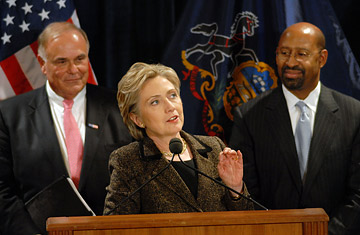
Hillary Clinton is endorsed by Pennsylvania Governor Edward G. Rendell and Philadelphia mayor Michael Nutter at Philadelphia City Hall on January 23, 2008 in Philadelphia, Pennsylvania
(2 of 2)
Sue Gregson, a freelance writer from nearby Downingtown, started holding events for Obama in March of last year. She even tried calling the national campaign for help, but couldn't get much out of them. "They could hardly staff the phones at that point; everyone was calling in. I didn't even get material from the campaign," she said. "They had little packets eventually that they sent to people who were having house parties, but mine was too early." So she bought an "Obama for President" sweatshirt and went to work on her own. "We would basically just meet in peoples' houses and talk about what we can do on a shoestring budget, because people were talking money out of their own pockets," she said. "That hoodie was probably the best $35 I ever spent. It's my trademark."
So great was the grassroots enthusiasm that some of Obama's more experienced Pennsylvania supporters had to step in to bring order to the campaign, holding organizational meetings in January in Philadelphia and Pittsburgh to begin the process of naming delegates to an Obama slate in advance of the primary. "You could either allow that [enthusiasm] to dissipate, or allow it to go off in all these different directions where it would create counter purposes," said Pittsburgh attorney Cliff Levine, who chaired the western organizational meeting. But "by marshaling everybody together and trying to map out the wildfire of enthusiasm, that little bit of structure allowed this to grow very quickly and in an organized way."
The Clinton campaign, meanwhile, has taken a different approach, focusing on securing high-level support from most of the state's Democratic establishment, including Nutter, Rendell and state party chairman T.J. Rooney. "While the Obama campaign has a lot of enthusiastic people on their list of delegates, our delegates are mostly county commissioners, party chairmen and others," said Lazar Palnick, an organizer for Clinton in Western Pennsylvania and a longtime friend of the Clintons dating from his youth in his native Arkansas. "Each of those have extensive networks that we intend to take full advantage of and make good use of to operate the mechanics of a serious get-out-the-vote operation."
Nutter, meanwhile, admits that Obama's base seems more strongly enthusiastic than Clinton's, but he said the experience and political muscle of the New York Senator's base may prove stronger. Obama's organization "certainly has to be respected," he told TIME, but the key is "how you translate that into on-the-ground troops that know how to run elections and get people to come out to the polls. It's one thing to have events and rallies and be moved by stirring oratory; it's another that people know you and are motivated to come out to the polls and actually push your button."
Obama supporters and some media commentators, however, have suggested that Clinton's campaign in Pennsylvania is top-heavy and poorly organized, pointing to the fact that she failed to fill all 103 slots on her delegate slate — a routine and basic exercise in political organizing — despite a two-day deadline extension from the governor. "It indicates to me they weren't sufficiently prepared for this and they fell asleep at the switch," Madonna said. The campaign, however, dismisses this as "a story about nothing," saying a few would-be delegates failed to file their paperwork for personal reasons, such as illness. Even so, they say, the delegate slate is a minor technical matter and Clinton will get credit for every delegate she wins, whether or not she actually named a full slate of delegates. "It's just a matter of waiting for the media to get bored with the subject," spokesman Mark Nevins said. "Nobody else is talking about it."
And even if the Clinton campaign did get off to a later start in Pennsylvania than Obama's, it was clear in the days leading up to the Ohio and Texas primaries that the organization was getting geared up. It opened offices in both Pittsburgh and Philadelphia and began holding meetings across the state to fire up volunteers. "We are not going to concede any votes to Barack Obama," Dyk told the Philadelphia meeting.
The Clinton volunteers themselves seem aware that the weight of emotion, and perhaps grassroots momentum, seems to lie with Obama, but they say they can deliver Pennsylvania for her. "I feel like this is when she really needs our support the most," said Elsa Louis-Charles, 34, a legal assistant from suburban Glenside. "I try not to watch the numbers so much." Hannah Miller, 31, of Philadelphia, signed up to volunteer hoping that Clinton would be the one to stand up against the war in Iraq and the increasingly militarized nature of American society. She said Pennsylvania will be the key to Clinton's comeback victory. "I think the whole race is going to change," she said. "I think it's going to change in Pennsylvania ... I think something magical is going to happen in her campaign here."
